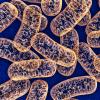Lisa Marshall
- Researchers have discovered a protein variant that serves as a knob for regulating the body’s innate immune response. The findings could lead to new therapies for Long COVID, autoimmune disorders and more.
 Being awake when your body thinks you should be sleeping can make you more susceptible to viruses, make your wounds heal more slowly and promote weight gain. And don't even think about driving the day after an all-nighter.
Being awake when your body thinks you should be sleeping can make you more susceptible to viruses, make your wounds heal more slowly and promote weight gain. And don't even think about driving the day after an all-nighter. Females sleep less, wake up more often and get less restorative sleep than males, according to a new study. The findings could have broad implications for biomedical sleep research, which for decades has focused primarily on males.
Females sleep less, wake up more often and get less restorative sleep than males, according to a new study. The findings could have broad implications for biomedical sleep research, which for decades has focused primarily on males. CU’s Digital Legacy Clinic helps people take steps to preserve their own legacy or manage the virtual heirlooms of loved ones who have died.
CU’s Digital Legacy Clinic helps people take steps to preserve their own legacy or manage the virtual heirlooms of loved ones who have died. Young adults sit 60-plus hours per week, boosting their heart disease risk and accelerating signs of aging, according to new research. Vigorous exercise works best to counteract it, but sitting less is ideal.
Young adults sit 60-plus hours per week, boosting their heart disease risk and accelerating signs of aging, according to new research. Vigorous exercise works best to counteract it, but sitting less is ideal. Psychologist Angela Bryan, like many other avid runners, is no stranger to what many call the “runner’s high.” The scientist breaks down what happens in the body to make you feel so good during a long jog.
Psychologist Angela Bryan, like many other avid runners, is no stranger to what many call the “runner’s high.” The scientist breaks down what happens in the body to make you feel so good during a long jog. CU Boulder researchers have developed a new sound-based, handheld device that can swiftly and accurately detect signs of disease in a pin-prick of blood. Their findings are published in the journal Science Advances.
CU Boulder researchers have developed a new sound-based, handheld device that can swiftly and accurately detect signs of disease in a pin-prick of blood. Their findings are published in the journal Science Advances. From his home garden, CU Boulder’s Chris Lowry explains why humans get so much enjoyment out of sinking their hands into dirt—it may have something to do with the friendly microbes that live in the soil.
From his home garden, CU Boulder’s Chris Lowry explains why humans get so much enjoyment out of sinking their hands into dirt—it may have something to do with the friendly microbes that live in the soil. Scientists have long wondered why animals get the DNA inside their mitochondria, the cell’s energy center, only from their mothers. New research explains why and offers hope for treating mitochondrial disorders.
Scientists have long wondered why animals get the DNA inside their mitochondria, the cell’s energy center, only from their mothers. New research explains why and offers hope for treating mitochondrial disorders.
 New CU Boulder research suggests that while bereavement support spaces like Reddit can be therapeutic, they can potentially traumatize users.
New CU Boulder research suggests that while bereavement support spaces like Reddit can be therapeutic, they can potentially traumatize users.


